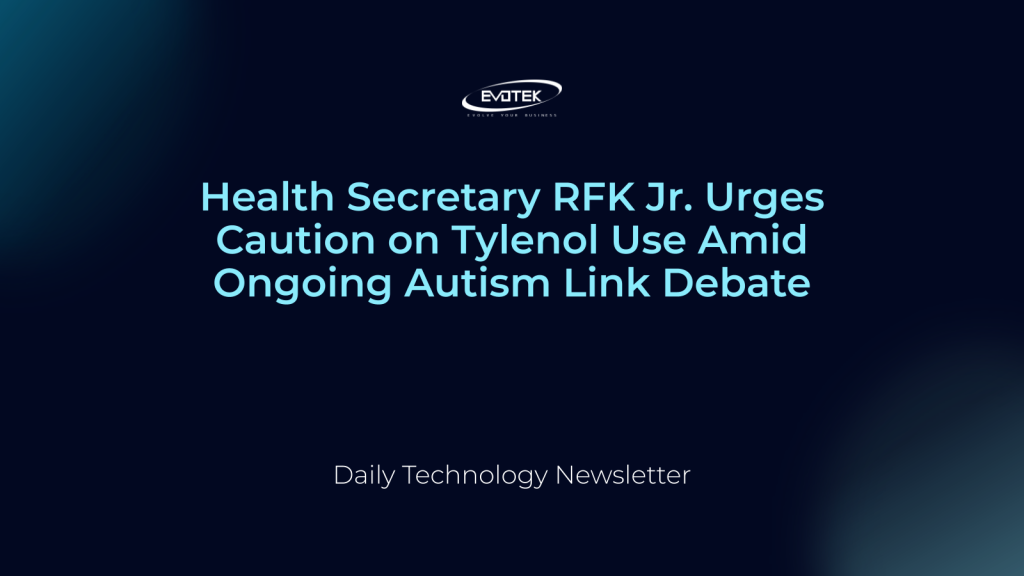Health Secretary Robert F. Kennedy Jr. stated on October 29 that definitive evidence linking the pain medicine Tylenol (acetaminophen) to autism is “not sufficient.” However, he stressed the need for a “cautious approach” to its use, particularly during pregnancy and the perinatal period, citing “very suggestive” animal, blood, and observational studies.
Kennedy’s comments arrive more than a month after the White House issued general discouragement against the medicine’s use by pregnant women and young children. President Donald Trump’s administration had previously indicated that U.S. health officials would recommend limiting Tylenol’s use, with Trump himself repeatedly advising, “Don’t take Tylenol” unless absolutely necessary.
The Nuance in Kennedy’s Stance
“The causative association… between Tylenol given in pregnancy and the perinatal periods is not sufficient to say it definitely causes autism. But it is very suggestive,” Kennedy told reporters. Emily G. Hilliard, Health and Human Services press secretary, clarified that Kennedy’s latest remarks align with his consistent position on the matter.
This discussion unfolds concurrently with a lawsuit filed by the Texas attorney general against Kenvue, the manufacturer of Tylenol, over the alleged autism link. Kenvue, spun off from Johnson & Johnson in 2023, has firmly defended its product, asserting there is no scientific basis for a causal link to autism and warning that such suggestions could jeopardize maternal health. The company also urged the FDA to reject calls for an autism warning on Tylenol’s label.
Earlier Warnings and Official Responses
In September, President Trump and Health Secretary Kennedy, neither of whom are medical doctors, held a press conference to caution pregnant women against taking the medication. Trump reiterated his warning on Truth Social, advising against Tylenol for pregnant women “UNLESS ABSOLUTELY NECESSARY” and for young children “FOR VIRTUALLY ANY REASON.” Kennedy, during an October 9 Cabinet meeting, emphasized, “It is not proof. We’re doing the studies to make the proof.”
The Food and Drug Administration (FDA) announced on September 22 that it would “issue a physician notice and begin the process to initiate a safety label change for acetaminophen.” The FDA acknowledged “prior clinical and laboratory studies that suggest a potential association between acetaminophen use during pregnancy and adverse neurodevelopmental outcomes.” However, it also recognized “contrary studies showing no association and that there can be risks for untreated fever in pregnancy, both for the mother and fetus.” The Department of Health and Human Services recommends that clinicians “exercise their best judgment” given the “conflicting literature and lack of clear causal evidence.”
Autism Prevalence and Industry Reaction
The Centers for Disease Control and Prevention (CDC) reported in April that in 2022, 1 in 31 children were diagnosed with autism by age 8 in the United States, an increase from 1 in 36 children in 2020. The prevalence among boys was notably higher at 1 in 20, a five-fold increase since 2000.
Kennedy’s earlier claims regarding a potential autism link initially impacted Kenvue’s share prices and drew pushback from many medical professionals. Kenvue’s statement aligns with Kennedy’s call for caution, saying, “We agree, as Secretary Kennedy said, that the best message to pregnant women is to consult their healthcare professional before taking acetaminophen, which is what our Tylenol label tells consumers to do. We also agree that there is no definitive causative association between taking acetaminophen and autism.”
On October 29, Kenvue shares closed down 1.4%, reflecting the ongoing volatility surrounding this contentious issue.

 日本語
日本語 한국어
한국어 Tiếng Việt
Tiếng Việt 简体中文
简体中文